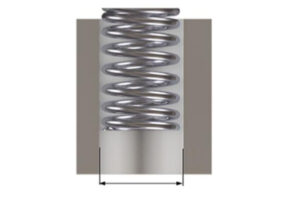The Excellence of Stainless Compression Springs in Manufacturing
 At our comapny, we provide a range of high-quality stainless steel compression and extension springs. Our stainless steel springs are meticulously crafted with standard passivation for optimal performance. Additionally, we offer custom-built applications using Stainless Steel raw material to meet specific requirements. For added versatility, our stock of standard 302 Stainless Steel springs can be tailored to Stainless Steel upon request.”
At our comapny, we provide a range of high-quality stainless steel compression and extension springs. Our stainless steel springs are meticulously crafted with standard passivation for optimal performance. Additionally, we offer custom-built applications using Stainless Steel raw material to meet specific requirements. For added versatility, our stock of standard 302 Stainless Steel springs can be tailored to Stainless Steel upon request.”
Why Stainless Compression Springs:
They are mechanical devices designed to store energy when compressed and release that energy when the force is removed. They are commonly used to resist applied compressive forces or to provide support and shock absorption in a wide range of applications.
Manufacturing Process:
The production of stainless compression springs involves several steps to ensure their quality and precision:
a) Material selection: Stainless steel is the preferred choice for such springs due to its high corrosion resistance, strength, and longevity. Different grades of stainless steel may be selected based on specific application requirements.
Mainly,it to be stainless 304 or 316
b) Coil winding: The manufacturing process begins with precision coil winding machines, which wind the stainless steel wire into tightly wound coils. This process determines the spring’s height, inner diameter, and pitch.
c) Heat treatment: Heat treatment is crucial to enhance the strength and durability of stainless compression springs. This process involves subjecting the coiled springs to controlled heating and cooling cycles to optimize their mechanical properties.
d) Surface finish: Depending on the application, the springs may undergo additional processes such as shot peening or electroplating to improve surface characteristics like smoothness, corrosion resistance, and aesthetic appeal.
e) Inspection and quality control: Rigorous inspection procedures are implemented to ensure the dimensional accuracy, load-bearing capacity, and overall quality of the stainless compression springs. This guarantees that every spring meets or exceeds industry standards.
Advantages of Stainless Compression Springs:
They offer numerous advantages that make them suitable for a wide range of applications:
a) Corrosion resistance: Stainless steel springs are highly resistant to corrosion, making them ideal for applications in harsh or corrosive environments, such as marine, chemical, or outdoor equipment.
b) High strength and durability: Stainless steel exhibits excellent tensile strength and fatigue resistance, ensuring that such springs can withstand heavy loads and repeated cycles without failure.
c) Temperature resistance: They maintain their mechanical properties even under extreme temperatures, making them suitable for applications in industries like automotive, aerospace, and oil and gas.
d) Versatility: It can be customized to meet specific requirements based on factors such as load capacity, spring rate, and dimensions. This versatility allows for tailored solutions to diverse applications.
e) Longevity: With their superior corrosion resistance and robust construction, stainless compression springs have a longer service life compared to other materials. This reduces maintenance costs and ensures reliable performance over an extended period.
Get A Free quotation from us
As a manufacturer specializing in stainless compression springs, we recognize the importance of these critical components in various industries. The durability, reliability, and numerous advantages of such springs make them the preferred choice for applications requiring high-performance springs. Through our careful material selection, precision manufacturing processes, and rigorous quality control, we ensure that our stainless steel springs meet the demanding requirements of our customers, contributing to the success and longevity of their products.






